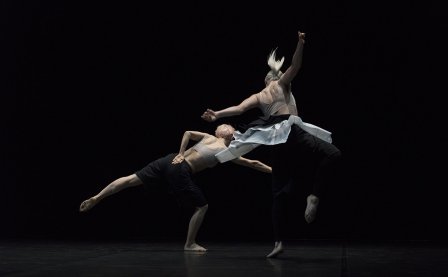Can noise feel political? Or at least incite the desire to be awake to the political? There’s a sense of rage and restlessness to the latest from prolific Australian soundscaper Lawrence English. In an interview with The Seventh Hex, English describes Wilderness of Mirrors as “something of a soundtrack to wake those from their slumber before the nightmare becomes real, instead of imagined,” and later as a record “for those who are awake.” This is an idea he explored with Liz Harris (Grouper) on last year’s self-titled debut as Slow Walkers, wherein we listless listeners were rendered as zombies, marchers en masse clueless but for cannibalism. If that sounds horribly pessimistic, at least now English wants listeners to hear (and feel) themselves as agents trapped in the noise.
His recordings have always paid close attention to the ripples and contours in sheets of noise, giving small sounds their due. English said when recording this album he was inspired by live performances from My Bloody Valentine, Swans, and Earth, and those titans’ commitment to moving air and bone with their music can be heard throughout here. As we feel the album in our vibrating headphones and rattling chest, English makes us feel in our gut his sense of something-gone-wrong, which is central to our experience listening to this album. To that end, he uses bass tones and shrill distortion to shake up the listener. Here, his object seems to be the present, which he gives us the sense is doomed if we don’t do something.
The title is instructive. Until we are out of the woods of self-reflection, we will be ignorant to reflexivity and therefore numb to our present. Lauren Berlant describes our felt political present as an impasse in which we are treading water, with the double-bind of cruel optimism barely to sustain us: our attachments to the fantasy of the good life and a certain state-citizen political relation are what inhibit us from actually forging a collective livable present out of a crisis that has become ordinary. Song titles like “Graceless Hunter” and “Hapless Gatherer” clue us in on the album’s political frustration with a sort of generalized distractedness characteristic of those who face diminishing life chances and are barraged with misinformation. The music sounds hard, but not hardened against action; it’s supposed to be compelling.
Wilderness Of Mirrors is tiring, drawn-out, forceful noise that dwells on discomfort and our (compulsory?) readiness to ignore it. The album’s conceptual success doesn’t make its 39 minutes any less “challenging,” which is to say: I’m not tryna listen to this all the time. If anything, its difficulty is a testament to its gloomy power, the kind of downer that will bum you out if it doesn’t get you thinking. And who’s to say the album is successful if it turns away the listener before its intentions can sink in? This might also explain why English prescribed the album for those who are already awake and as an alarm.
Opener “The Liquid Casket” begins before you’re ready for it, with an uneasy hum that stays still and then sucks in for a moment before a crash of distortion explodes the landscape. High-pitched tones holler in and out, hammered dulcimer clatters away in the middle of the mix, and roaring winds threaten to overtake everything. The song ends without ending, its echoes and atmosphere lingering on, as slow percussion bangs in the distance, like the last drummer on a deadened battlefield.
In the wreckage of “The Liquid Casket,” the clarion pangs of “Wilderness Of Mirrors” sting like a change in the air. These same surging stabs of noise return at the close of the album, almost like a rallying cry already fading, and fading before the end into quietness, a sickening stillness. “Guillotines And Kingmakers” is the wasteland that follows the wilderness. It lacks the drama of its title, which might be the point: dominant political forces and events in our moment are strategically invisibalized, easily turned away from now. The album becomes the numbing wall of noise — soft and loud, bracing and boring — that we can retreat to. Our contemporary wilderness of mirrors, the TV and phone screens that surround us, can show us a reflection to get lost in, even when they’re not blank.
The video for “Forgiving Noir” is a loop that follows a wanderer through the woods, a locked-groove literalization of missing the forest for the trees, always facing away from what’s lurking just behind (or before) you. The song’s reverberating darkness works on the idea of forgiving light, whereby to cast something in a forgiving light is actually to cast it into shadow, not beyond doubt, and into obfuscation and deceit. Wilderness Of Mirrors wants us to look deeper into those shadows, and not to be petrified by what we see, but charged. This album has the power to make you feel uncomfortable enough to look away from yourself, which isn’t easy.
More about: Lawrence English




